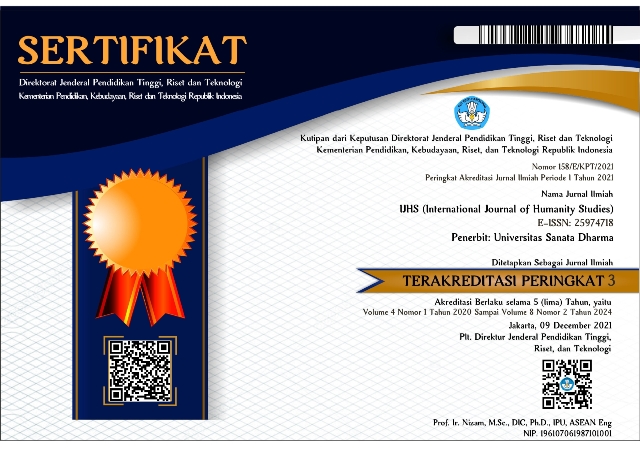MEN’S SEXUAL TRAUMA RESISTANCE IN BLACK AMERICAN FOLKLORE: A POSTCOLONIAL CRITICISM OF NEGRO “WOMAN TALES”
(1) Ecole Normale Superieure du Burundi, Burundi
(*) Corresponding Author
Abstract
The purpose of this paper “Men’s Sexual Trauma Resistance in Black American Folklore: A Postcolonial Criticism of Negro “Woman Tales” from the Gulf States” was to discuss the reflection of postcolonial sexual trauma and resistance to it through storytelling among African Americans in the Gulf States. The study was concerned with 3 folktales classified under the cycle “Woman Tales”. The folktales were selected from the collection made by Zora Neale Hurston in the southern states of Alabama, Florida, and Louisiana from 1927 to 1930 and compiled in the book Every Tongue Got to confess: Negro Folktales from the Gulf States (2001). The postcolonial approach and trauma theory based on the interpretative qualitative method and library research was used in the discussion of the selected folktales. It was found that the performance of the “Woman Tales” is informed by the black men’s traumatic memories of slavery and post-slavery emasculation. Black male narrators imitate trauma narratives in which they reflect male sexual trauma and recreate black woman identity to contain it. Through this imitation and reflection, the folktales challenge the legacy of the plantation patriarchy by reconstructing a woman's identity that is docile to black masculinity.
Keywords
Full Text:
PDFReferences
Bauman, R. (Ed.). (1992). Folklore, cultural performances, and popular entertainments: A communications-centered handbook. New York: Oxford University Press.
Bronner, S. (2002). Folk nation: Folklore in the creation of American tradition. Wilmington: Scholarly Resources, Inc.
Chireau, Y. (2003 ). Black magic: Religion and the African American conjuring tradition. Berkeley: University of California Press.
Collins, P. H. (2000). Black feminist thought: Knowledge, consciousness, and the politics of empowerment. New York: Routledge.
Hooks, B. (1992). Black looks: Race and representation. New York: Routledge.
Hooks, B. (2004). We real cool: Black men and masculinity. New York and London: Routledge.
Hurston, Z. N. (2000). Their eyes were watching god. Pymble: Harper Collins Publishers .
Hurston, Z. N. (2001). Every tongue got to confess: Negro folk-tales from the Gulf States. New Harper: Collins Publishers.
Jefferess, D. (2008). Postcolonial resistance: Culture, liberation, and transformation. Toronto: University of Toronto Press Incorporated.
Kusharyanto, J. (2012). Woman’s reconciliation of domestic life and self development in Elizabeth Stuart Phelps’s the angel over the right shoulder. Humaniora, 24(2), 201-210.
Marbley, A. F. (2011). Multicultural counseling: Perspectives from counselors as clients of color. New York: Routledge.
Martínez-Falquina, S. (2015). Postcolonial trauma theory in the contact zone: The strategic representation of grief in Edwidge Danticat’s claire of the sea light. Humanities, 4(4), 834–860.
McGregory, J. (2013). African American community. In Simon Bronner (Ed.). Encyclopedia of American folklife. New York: M. E. Sharpe.
Nikia, T., & Smith, M. W. (2012). An exploration of African folktales among among the gullah community of the South Carolina sea islands: History, culture, and identity. Electronic Theses and Dissertations, Paper 1352. https://doi.org/10.18297/etd/1352
Peterson, C. (2011). Slavery’s bestiary: Joel Chandler Harris’s uncle remus tales. Paragraph, 34(1), 30–47.
Pucherova, D. & Gafrik, R. (Eds.). (2009). Postcolonial Europe? Essays on post communist literatures and cultures. Leiden: Brill Ropodi.
Purnowidodo, P. (2003). Joel Chandler Harris' Uncle Remus and Afro-American folktales (Unpublished Master thesis). Universitas Gadjah Mada, Yogyakarta.
Roberts, J. W. (1990). From trickster to badman: The black hero in slavery and freedom. Philadelphia: University of Pennsylvania Press.
Saktiningrum, N. (2017). Framing a trickster character in two different media and eras: A study of Br'er Rabbit in uncle Remus'stories and disney song of the south. Humaniora, 29(2), 198-206.
Sethi, R. (2011). The politics of postcolonialism: Empire, nation and resistance. London: Pluto Press.
Starota, W. J. & Chen, G. (Eds.). (2003). Ferment in the intercultural field: Axiology, value, and practice. Thousands Oaks: Sage Publications.
Thiong'o, N. W. (2007). Notes towards a performance theory of orature. Performance Research, 12(3), 4-7. https://doi.org/10.1080/13528160701771253
Vaz, A. A. (2013). Escape from physical labour as depicted in the plantation tales of African American vernacular literature. English Studies International Research Journal, 1(1), 12-14.
Visser, I. (2015). Decolonizing trauma theory: Retrospect and prospects. Humanities, 4(2), 250–265.
Ward, A. (Ed.). (2015). Postcolonial traumas: Memory, narrative, resistance. Hampshire: Palgrave Macmillan.
DOI: https://doi.org/10.24071/ijhs.v6i2.5702
Refbacks
- There are currently no refbacks.
Copyright (c) 2023 Simon Ntamwana

This work is licensed under a Creative Commons Attribution-ShareAlike 4.0 International License.
Indexed and abstracted in:
IJHS Sinta 3 Certificate (S3 = Level 3)
International Journal of Humanity Studies (IJHS) has been nationally accredited Sinta 3 by the Ministry of Education, Culture, Research and Technology of the Republic of Indonesia based on the decree No. Surat Keputusan 158/E/KPT/2021. Validity for 5 years: Vol 4 No 1, 2020 till Vol 8 No 2, 2024

This work is licensed under CC BY-SA.
Creative Commons Attribution-ShareAlike 4.0 International License.
p-ISSN: 2597-470X (since 31 August 2017); e-ISSN: 2597-4718 (since 31 August 2017)
Notice: The opinions expressed in this publication are those of the authors. They do not purport to reflect the opinions or views of the editorial team or publishers.
International Journal of Humanity Studies (IJHS) is a scientific journal in English published twice a year, namely in September and March, by Sanata Dharma University, Yogyakarta, Indonesia.

















